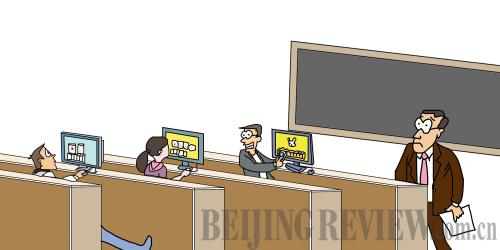|
 |
|
(LI SHIGONG) |
As a foreign teacher (in Chongqing Nanfang Translators College of Sichuan International Studies University) in China, I expect some mild culture shock, some mild misunderstandings. But instead I got a big shock and possibly a big misunderstanding in the form of the kindergarten university. No, this educational institution won't appear in your English dictionary, but it does appear in China.
I was shocked when my fellow foreign teacher described my university's students (about 18-22 years old) as "college children." I was just as shocked when my students described their peers as children.
In a kindergarten university, the students act like children. They reject responsibility. They do not want to be educated in class, but they want to be entertained. They want to hear funny stories about foreign culture. They spend most of their time playing online computer games and watching movies on the Internet. But like children they get bored very easily and cannot concentrate. So in class, they compulsively play on their mobile phones. They constantly seek attention. And like a spoiled brat in a kindergarten, they complain when they do not get what they want.
A kindergarten university is private. The owners of the university build the school to make money to fund their main business. They aim solely to maximize revenue by maximizing the number of enrolled students. The quality of the students does not matter. The quality of the teachers does not matter. The quality of the education does not matter. The future impact on China does not matter. What matters is that the "children" are happy and stay. And to keep them happy, you have to make it very easy for them to study and pass exams.
The Chinese Government wants to sustain growth. But how can they sustain growth if intelligence is transferred to the east coast? Businesses that are set up in west China complain that the people are like children—they do not work hard, their qualifications are meaningless, and they complain and want high salaries.
This education system harms China. Its strict hierarchy of opportunity means that every year millions of innovations and millions of great ideas will never be created, developed and sold. China is like a world champion hurdler who ties one hand behind his back.
The Chinese education system is the opposite of the European (and North American) system. In the European system, the best schools and universities are funded by private individuals and institutions. The politicians who manage public schools send their children to private schools. The public schools consistently fail to compete with private schools. It is more important to get into the university with the best brand reputation—based on corrupt rating systems—than to be the best. The students of these universities choose the jobs they want. In effect, the university arbitrarily decides the hierarchy of the society.
China could take advantage of the numerous weaknesses in the European education system. It could easily eliminate corruption at high schools by setting one national exam, delivered through the Internet; by placing cameras in every exam class which the public can watch and by marking the exams by five randomly chosen and separated examiners. This would instantly restore public faith and respect in the high school education system.
It could eliminate corruption at universities by making the master's entrance exams to be the final exam for all university students. It could ensure students get no marks for attendance, only for exams and coursework. Employers would have much greater trust in the system, they would find better employees. It could analyze the correlation between work performance and exam performance, and use this information to create exams that are most useful for employers. It could ensure all students get six months experience with an employer. And 30 percent of their final mark is based on their work performance.
Finally, it could set a national minimum quality standard for all universities and colleges. It could create an inspection service that randomly audits colleges and universities, and gives each a quality rating for food, classrooms, libraries, housing, environment (clean and green) and exam performance. China could use a bottom-up approach to turn these kindergarten universities into world-class universities. And this will pressure the better universities to compete better with the big brand name foreign universities.
The author is a Briton living in Chongqing
Email us at: liuyunyun@bjreview.com | 